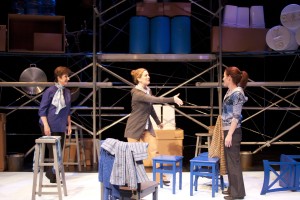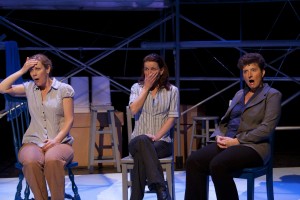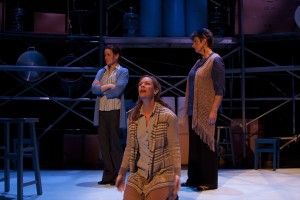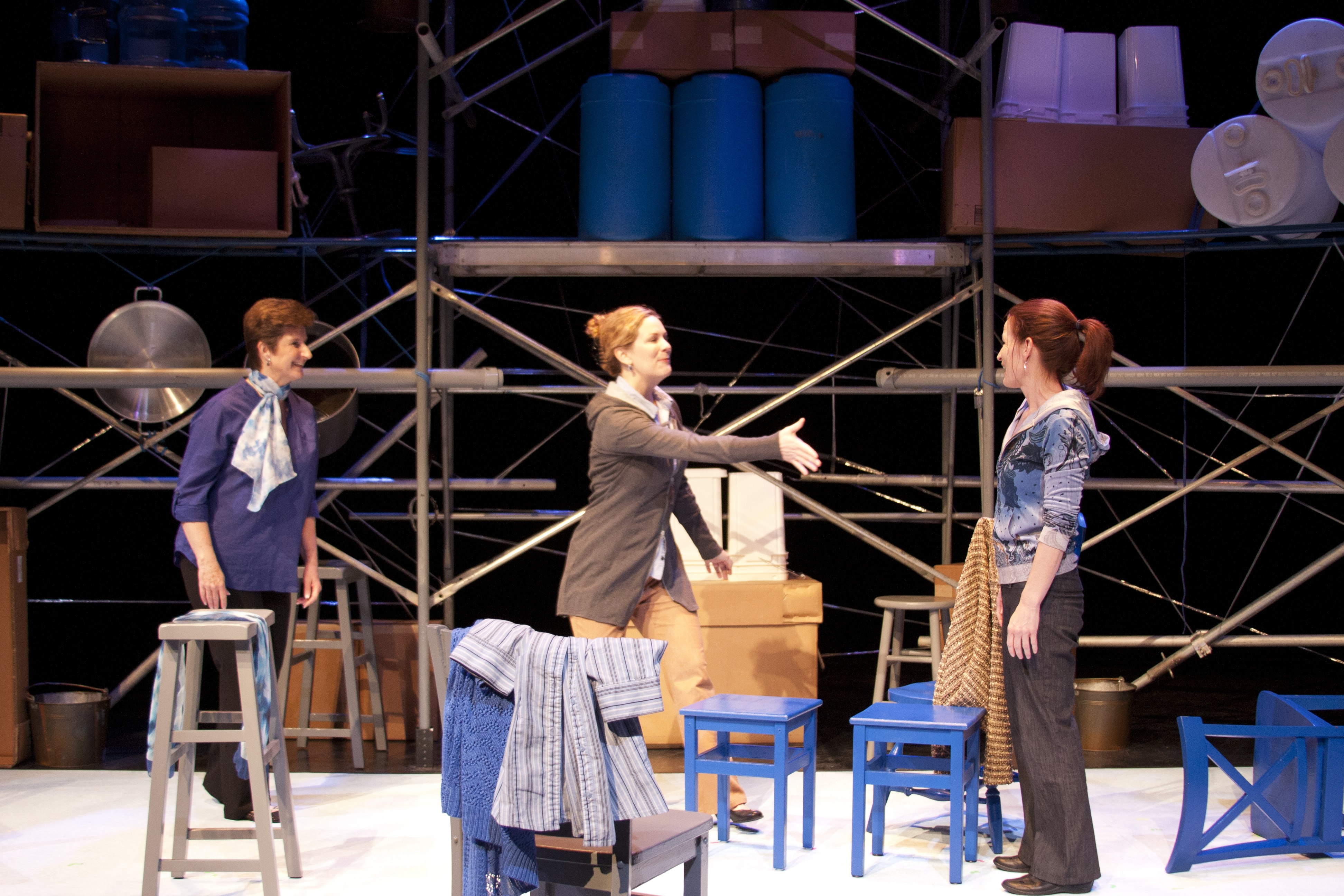In each of the short plays that comprise Eric Samuelsen’s latest work ‘3,’ Platonic notions of order and perfection are treated with stunningly effective realism. Plan-B Theatre’s latest premiere brings audiences close to the Mormon soldiers of ambition – women who crave validation, status and institutional acceptance and who desire getting something tangible or identifiable to show for their struggles and troubles.

Indeed, the opening night performance of ‘3’ in a season where Plan-B has crafted socially conscious theater with exceptionally high standards of artistry was as close to perfection as possible. The cast of three actors — Stephanie Howell, Teresa Sanderson and Christy Summerhays – responded beautifully to the shifts in rhythmic pacing and tension in and among the three short plays.
The actors captured the precise instinct of particular archetypes that did not happen instantaneously but that were cultivated and nourished generation by generation in Mormon wards. In each of the short plays, the packaging of women is evident in all forms even as the characters adhered to strictly homogeneous protocols of style, tone and manners. While Samuelsen chose to portray Mormon women in their wards, capturing brutally honest and natural realizations, ‘3’ would compel comparable images in other settings, regardless of race, creed, ethnicity and social background. The Darwinian process is unrelentingly harsh, as one must look and fit the role in order to be accepted and then if one fails to stay in character, there is the risk of being excluded and, perhaps worse, evicted. Those who are misfits and underperformers must change or they cannot stay.
These themes get distinct topical treatments in each of the short plays. The production opens with the crisp witty tones of ‘Bar and Kell,’ who take on the project of getting Brandie, an unwed mother, married to her boyfriend. As it turns out, Brandie puts up virtually no resistance to Bar, a paragon of efficiency who understands frighteningly well how value is created by supply and demand. Bar tells Brandie, “One year training, and then you’re, you know, marketable. And it’s flexible; you can work in a salon, or maybe even cut hair out of your basement while you stay home with the kids.” So effective is Bar’s ‘project’ that Brandie refuses to heed Aunt Dot’s criticisms about the ward women’s intentions: “You care! Yeah, about every house in the neighborhood having a nice mowed lawn, toys picked up and kids all scrubbed. You care about ‘property values.’”

The actors take the right tone of delight in the snappy, humorous momentum of ‘Bar and Kell.’ A noteworthy example occurs when Bar (Sanderson) and Kell (Summerhays) speak their lines clearly while Brandie (Howell) relates her background in monologue. The contrapuntal effect works marvelously with Bar and Kell injecting snarky pop cultural references as Brandie recounts an unplanned pregnancy, a bit of exhibitionism at a rock concert, and her boyfriend Kenny’s desire to get plastic surgery after a roofing accident (which worker’s compensation will not cover). As Brandie finishes, Bar hits spot on with the line, “Got a ways to go with this one.” The pace proceeds at such a whirlwind that Brandie has no chance of reconsidering what’s happening to her. Bar gets her victory and Brandie’s happiness is really nothing more than avoiding the pain of being rejected.
While the humor is still evident in ‘Community Standard,’ the second play, the actors lengthen the pacing a bit, feeling the right instincts about the topic of objectification and our broader heady obsession with rectifying our shortcomings in the genetic lottery by artificially enhancing our self-image. There’s a harder edge in the case against perfection presented here, partly in the form of an obscenity trial that leaves questions as to whether a different community standard should be put forward for judgment. Recounting how her husband wanted her to watch films with him to spice up their love life, Chris (Sanderson) says, “For me, they didn’t have the effect he wanted. So I’d end up reading a Harlequin romance or something so I could keep up with him.”
Bertine (Summerhays) is more blunt: “They’re just a bore. I just don’t get it even a little bit. This is gonna sound stupid, but what they really remind me of is that video game, Mortal Kombat. I mean, what’s the appeal? Bad guy shows up, your guy fights him. If you win, another bad guy shows up and your guy fights him. Well, these were sex instead of fighting, but every bit as boring.” Janeal (Howell) is more resistant and zeroes in more painfully, recalling how her husband always was measuring and comparing her to other women, almost as if there was a catalog of the archetypal Mormon beauty. She says, “I know . . . I know you all hate me. For being so stubborn, and. . . . But see . . . the community standard isn’t just that we’re all Mormons, or that we’d all say we’re against something in a poll. It’s . . . well, I think it’s what you really believe. In your guts. In your soul. Your actions. And I look at those movies, and they’re really . . . awful, the way women are treated.”
In ‘Duets,’ the closing play, Samuelsen brings the struggle to a shocking close. The humor leaves abruptly, as he swings the arc from the nice, even if false, cosseting ambience of the first play to the inevitable buildup of tragic tension in the final act. The audience never sees Sondra’s gay husband but it observes just how high the price has become for sustaining an unrelentless, demanding pretense where negotiating the emotional minefield has become too laden with pressure to be anything but exhausting. For a while, Sondra (Summerhays) and her husband try to keep up appearances, gaining admiration from ward members for their singing ability in the choir. But, as Sondra admits to Candance (Teresa) and Sherilynn (Howell), “Yeah. And he falls for them. And then, he can’t stand himself, he hates himself, he withdraws. Won’t go to church, won’t pray. Punishing himself. And then we sing together. And for a second, just for those few moments when we’re singing . . . it’s all we have. It’s the only way we can ever be together.”

What makes ‘3’ remarkable is the quiet, almost intimate feel that is miles away from the emotionally riveting tone of ‘Nothing Personal,’ the season opener by Samuelsen. Nevertheless, there is the same bottomline question in both instances that is as silent as it is traumatic to confront: Is the price we pay individually and collectively worth it in our agenda for perfectionism? Exploring the question most certainly straddles the line of religion and theology but it also is one that many philosophers and pundits today avoid venturing into the territory. ‘3’ asks all of us to reconsider where our moral, religious and ethical sensibilities lie. It is a call to rediscover humility and to find new appreciation for our natural gifts of human character.
Tickets are going quickly for this production, which ends April 6. Cheryl Ann Cluff’s direction and sound design, featuring music by Mindy Gledhill and snippets from the ‘Single Wards’ Mormon film soundtrack, add the right accent to the superb acting. Randy Rasmussen’s set design suggests a food storage locker with empty canisters and boxes. Rounding out the production is the consistently solid work of Jennifer Freed (stage manager), Phillip Lowe (costume design), and Jesse Portillo (lighting).
Performances are on Thursdays and Fridays at 8 p.m.; Saturdays at 4 p.m. and 8 p.m., and Sundays at 2 p.m. For ticket information, see http://planbtheatre.org.

